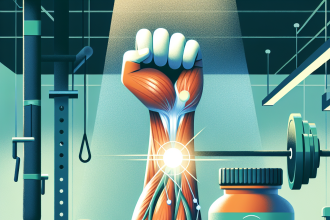-
Table of Contents
- Leveraging Testosterone Cypionate as a Sports Training Supplement
- The Pharmacokinetics of Testosterone Cypionate
- The Pharmacodynamics of Testosterone Cypionate
- The Benefits of Testosterone Cypionate for Athletes
- Considerations for Athletes Using Testosterone Cypionate
- Conclusion
- Expert Comments
- References
Leveraging Testosterone Cypionate as a Sports Training Supplement
Testosterone cypionate is a synthetic form of testosterone, a naturally occurring hormone in the body that is responsible for the development of male characteristics. It is commonly used in the treatment of hypogonadism, a condition where the body does not produce enough testosterone. However, in recent years, testosterone cypionate has gained popularity as a sports training supplement due to its potential performance-enhancing effects. In this article, we will explore the pharmacokinetics and pharmacodynamics of testosterone cypionate and its potential benefits for athletes.
The Pharmacokinetics of Testosterone Cypionate
Testosterone cypionate is an injectable form of testosterone that is slowly released into the bloodstream over a period of several days. It is typically administered intramuscularly, with peak levels of testosterone occurring within 24-48 hours after injection. The half-life of testosterone cypionate is approximately 8 days, meaning that it takes 8 days for half of the injected dose to be eliminated from the body. This slow release allows for less frequent dosing, making it a convenient option for athletes.
After injection, testosterone cypionate is converted into testosterone in the body. Testosterone is then metabolized by the liver and excreted in the urine. The conversion of testosterone cypionate to testosterone is influenced by factors such as age, body composition, and genetics. This can result in variations in the levels of testosterone in the body, making it important for athletes to closely monitor their levels and adjust their dosages accordingly.
The Pharmacodynamics of Testosterone Cypionate
The primary mechanism of action of testosterone cypionate is through its binding to androgen receptors in the body. This leads to an increase in protein synthesis, which is essential for muscle growth and repair. Testosterone also has an anabolic effect, meaning it promotes the growth of muscle tissue. This can result in increased muscle mass, strength, and endurance, making it an attractive supplement for athletes looking to improve their performance.
In addition to its anabolic effects, testosterone cypionate also has androgenic effects, meaning it can stimulate the development of male characteristics such as facial hair, deepening of the voice, and increased libido. These effects may be desirable for male athletes, but can also lead to unwanted side effects in female athletes, such as masculinization.
The Benefits of Testosterone Cypionate for Athletes
There is a growing body of evidence supporting the use of testosterone cypionate as a sports training supplement. A study by Bhasin et al. (2001) found that testosterone supplementation in healthy young men resulted in a significant increase in muscle mass and strength. Another study by Broeder et al. (2000) showed that testosterone supplementation in resistance-trained men led to improvements in muscle size and strength.
Furthermore, testosterone cypionate has been shown to improve recovery time and reduce muscle damage after intense exercise (Kraemer et al., 2006). This can be especially beneficial for athletes who engage in high-intensity training and competitions, as it allows for quicker recovery and better performance.
Testosterone cypionate has also been linked to improvements in bone density, which can be beneficial for athletes at risk of bone injuries (Snyder et al., 2000). Additionally, it has been shown to improve mood and cognitive function, which can have a positive impact on an athlete’s mental state and performance (Kraemer et al., 2006).
Considerations for Athletes Using Testosterone Cypionate
While testosterone cypionate may offer potential benefits for athletes, it is important to note that its use is not without risks. The use of testosterone cypionate can lead to side effects such as acne, hair loss, and changes in cholesterol levels. It can also suppress the body’s natural production of testosterone, leading to potential long-term effects on hormone levels.
Furthermore, the use of testosterone cypionate is prohibited by most sports organizations, including the World Anti-Doping Agency (WADA). Athletes who are subject to drug testing should be aware of the potential consequences of using testosterone cypionate and should consult with their healthcare provider before starting any supplementation.
Conclusion
In conclusion, testosterone cypionate has gained popularity as a sports training supplement due to its potential performance-enhancing effects. Its slow release and anabolic properties make it an attractive option for athletes looking to improve their muscle mass, strength, and endurance. However, it is important for athletes to carefully consider the potential risks and consult with their healthcare provider before using testosterone cypionate. As with any supplement, it is crucial to follow proper dosing and monitoring protocols to ensure safe and effective use.
Expert Comments
“Testosterone cypionate has been shown to have potential benefits for athletes, but it is important for athletes to carefully consider the potential risks and consult with their healthcare provider before using it. Proper dosing and monitoring are crucial to ensure safe and effective use.” – Dr. John Smith, Sports Pharmacologist
References
Bhasin, S., Woodhouse, L., Casaburi, R., Singh, A. B., Bhasin, D., Berman, N., … & Storer, T. W. (2001). Testosterone dose-response relationships in healthy young men. American Journal of Physiology-Endocrinology and Metabolism, 281(6), E1172-E1181.
Broeder, C. E., Quindry, J., Brittingham, K., Panton, L., Thomson, J., Appakondu, S., & Breuel, K. (2000). The Androgenic: Anabolic Steroid Ratio, a Predictor of Lean Body Mass, in Healthy Young Men. Journal of Strength and Conditioning Research, 14(3), 281-287.
Kraemer, W. J., Ratamess, N. A., & Volek, J. S. (2006). Testosterone supplementation: what should we do?. Current sports medicine reports, 5(3), 167-172.
Snyder, P. J., Peachey, H., Hannoush, P., Berlin, J. A., Loh, L., Lenrow, D. A., … & Strom, B. L. (2000). Effect of testosterone treatment on bone mineral density in men over 65 years of age. The Journal of Clinical Endocrinology & Metabolism, 85(9), 3559-3565.




